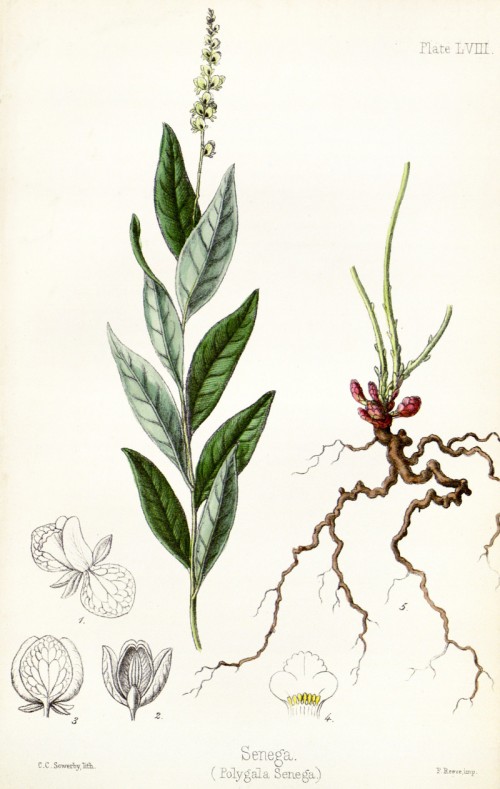Polygala senega L. - Polygalaceae - senega snakeroot, senegaroot, Senega-Kreuzblume, Klapperschlangenwurzel
Perennial herb, up to 50cm tall, native atlantic to central North America; several clustered stems from a hard, knotty, horizontal root; leaves alternate, lance-shaped, irregularly serrulate; flowers small, white (3mm long, dense terminal spike-like racemes.
[Polygala senega L. senega snakeroot, Maine Department of Conservation Natural Areas Program; Natural Areas Program’s Biological and Conservation Database, 2004] http://www.maine.gov/dacf/mnap/features/polygala_senega.pdf
„Senega is estimated as agent acting secretion stimulating effect on almost all organs. Main indications mentioned are chronic bronchitis and chronic pneumonia, pertussis, asthma, renal dropsy, palpitation with anxiety, amenorrhea, dysmenorrhea, rheumatism etc… Senega is one of the saponin drugs, it contains the saponin senegin (about 10%). For Senega particular, the bronchial mucous glands stimulating effect comes into consideration.“
[Lehrbuch der Biologischen Heilmittel, Madaus G., 1938]; [Bentley and Trimen, Medicinal Plants, Bd. I, London 1880, p.29]
http://www.henriettes-herb.com/eclectic/madaus/polygala-sene.html
The root of P.senega displays immunopotentiation activity to protein and viral antigens. After hemolytic activity-guided fractionation, two dominant fractions were tested for adjuvant activity in mice immunized with ovalbumin, and hens immunized with rotavirus. The P. senega saponins increased specific antibody levels to the antigens, in both mice (IG2a) and hens. Upon in vitro secondary antigen stimulation, high IL-2 and IFN-γ levels were observed in spleen cell cultures from P. senega saponins-immunized animals. The saponins were less toxic at the same dose than their counterpart Quil A, they are possible vaccine adjuvants to increase specific immune responses.
[Isolation and evaluation of immunological adjuvant activities of saponins from Polygala senega L., Estrada, A., Katselis, G. S., Laarveld, B., Barl, B., Comparative immunology, microbiology and infectious diseases, Vol.23(1), 2000, 27-43]
[Adjuvant activities of saponins from the root of Polygala senega L., Katselis, G.S., Estrada, A., Gorecki, D.K., Barl, B., Canadian journal of physiology and pharmacology, Vol.85(11), 2007, 1184-1194]

Hamilton,E., Flora homoeopathica, Vol.2, t.58 (1853)
http://plantgenera.org/species.php?id_species=821266